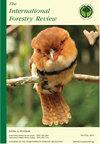Food Security and Agroforestry from the Perspective of the SDGs: A Case Study of the Democratic People's Republic of Korea
IF 0.9
4区 农林科学
Q2 FORESTRY
引用次数: 3
Abstract
HIGHLIGHTS Agroforestry has emerged as a potential solution to chronic food shortages and forest devastation in North Korea. Agroforestry is positively associated with the security of food, nutrition, environment, and energy. SDGs 1, 2, 3, 6, 7, 8, 11, 12, 13, and 15 can be achieved directly through agroforestry. International aid projects dominate agroforestry project in North Korea. The promotion of agroforestry programmes for food security (SDG2) and land restoration (SDG15) are linked to the achievement of other SDGs. SUMMARY This study analyses the contribution of agroforestry to the achievement of SDGs based on the performance of agroforestry and North Korea's Voluntary National Review (VNR). Since the early 2000s, North Korea has promoted agroforestry and worked with the Swiss Agency for Development Cooperation (SDC), the World Agroforestry Centre (ICRAF), and the FAO to expand agroforestry projects. Agroforestry has contributed to the achievement of food security and land restoration in SDG2 and SDG15. The achievement of SDGs from individual agroforestry pilot projects since the early 2000s allows the assessment of agroforestry's contribution to SDGs. North Korea is likely to restore degraded forests by sustainable forest management (SDG15), which emphasises the need for new land cultivation in the VNR to strengthen food security (SDG2). Because agroforestry practices can simultaneously enhance food, nutrition, environmental, and energy security, agroforestry can further contribute to the achievement of other SDGs by discovering models that reflect local characteristics and inducing residents to participate through a strict evaluation of their effectiveness and the use of ‘sloping land’ management accompanied by the development of cultivation technologies suitable for mixed management with various trees and crops.可持续发展目标视角下的粮食安全与农林:以朝鲜民主主义人民共和国为例
亮点农林业已成为解决朝鲜长期粮食短缺和森林破坏的潜在方案。农林复合经营与粮食、营养、环境和能源安全有着积极的联系。可持续发展目标1、2、3、6、7、8、11、12、13和15可以通过农林业直接实现。国际援助项目在朝鲜的农林项目中占主导地位。促进粮食安全农林业计划(SDG2)和土地恢复计划(SDG15)与实现其他可持续发展目标有关。摘要本研究基于农林业的表现和朝鲜的自愿国家审查(VNR),分析了农林业对实现可持续发展目标的贡献。自21世纪初以来,北朝鲜一直在推广农林业,并与瑞士发展合作署、世界农林业中心和粮农组织合作扩大农林业项目。农林业为实现可持续发展目标2和可持续发展目标15的粮食安全和土地恢复做出了贡献。自2000年代初以来,通过单个农林试点项目实现可持续发展目标,可以评估农林对可持续发展目标的贡献。朝鲜可能会通过可持续森林管理(SDG15)恢复退化的森林,该管理强调了在VNR进行新的土地种植以加强粮食安全的必要性(SDG2)。由于农林业实践可以同时提高粮食、营养、环境和能源安全,农林业可以通过发现反映当地特点的模式,并通过严格评估其有效性和使用“坡地”管理,以及开发适合与各种树木和作物混合管理的种植技术,吸引居民参与,从而进一步为实现其他可持续发展目标做出贡献。
本文章由计算机程序翻译,如有差异,请以英文原文为准。
求助全文
约1分钟内获得全文
求助全文
来源期刊

International Forestry Review
农林科学-林学
CiteScore
2.50
自引率
6.20%
发文量
29
审稿时长
>36 weeks
期刊介绍:
The International Forestry Review is a peer-reviewed scholarly journal that publishes original research and review papers on forest policy and science, with an emphasis on issues of transnational significance. It is published four times per year, in March, June, September and December. Special Issues are a regular feature and attract a wide audience. Click here for subscription details.
 求助内容:
求助内容: 应助结果提醒方式:
应助结果提醒方式:


